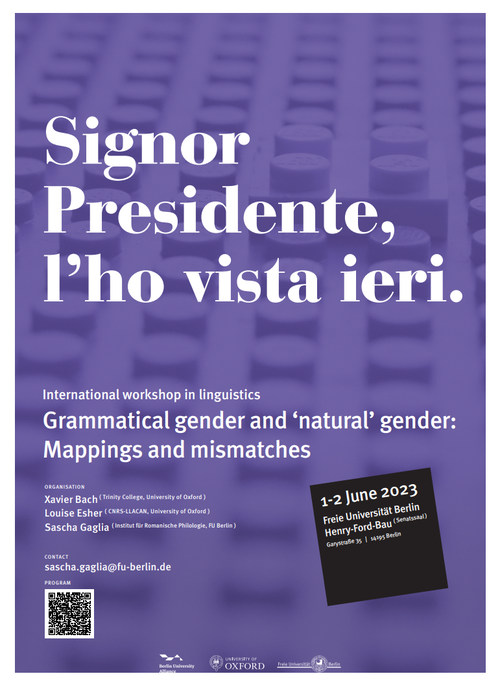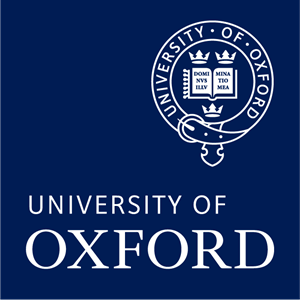Grammatical gender and ‘natural’ gender: Mappings and mismatches
Organizers:
Xavier Bach (xavier.bach@trinity.ox.ac.uk), Trinity College, University of Oxford
Louise Esher (louise.esher@cnrs.fr), CNRS LLACAN
Sascha Gaglia (local organizer) (sascha.gaglia@fu-berlin.de), Institut für Romanische Philologie, Freie Universität Berlin
We are organising this two-day workshop on the relationship between grammatical gender and ‘natural’ gender in order to bring together specialists in the linguistics of gender to reflect on these two notions: how they relate to each other, how they interact, and what potential alignments and mismatches between the two exist, and how the relationships between grammatical and ‘natural’ gender play out in language variation and linguistic typology. Moreover, the workshop findings on language structure will make an informed contribution to current public debate on gender in language.
The workshop will aim at discussing the relationship between ‘natural’ and grammatical gender in language, including, but not limited to, the following issues:
- gender resolution under coordination, e.g. mixed groups of people such as Fr. Michael♂ et Elisabeth♀, ilsM (...) ‘Michael and Elisabeth, they (...)’
- anaphoric resolution, e.g. Ger. [Das Mädchen]♀/N, esN geht zur Schule, wo sieF ihreF Freunde trifft, literally: ‘the girl, it goes to school, where she meets her friends’
- agreement in politeness, e.g. It. LeiF è generosoM ‘You are generous’, where the addressee is ♂
- gender assignment mismatches for higher animates, e.g. Fr. la sentinelleF ‘the sentry’, even for a male soldier, Ger. das MädchenN ‘the girl’
- structure of semantically based gender systems including reference to ‘natural’ gender, as well as resolution between default assignment rules and semantic assignment rules
- signalling of ‘natural’ gender of participants in languages without a grammatical gender system, or without a system based on assignment from ‘natural’ gender development, form and usage of ‘inclusive’, ‘gender-neutral’ or ‘non-sexist’ expressions to reduce sex/gender discrimination in language, e.g. It. le studentesse♀/F e gli studenti♂/M ‘female and male students’, inclusive It. lǝ maestrǝ♂/ ♀ ‘the teacher’; incl. Fr. les étudiant.e.s♂/♀ ‘students’, Fr. Madame♀ leM/laF ministreM/F‘Madam Minister’
- gender reference strategies for gender-diverse and non-binary individuals A common theme across these topics is an interest in the linguistic structure of gender systems, and how the strategies adopted by speakers may variously affirm, exploit, reflect, illustrate, subvert or extend this structure.
Talks will be held by (in alphabetical order)
Marc Allassonnière-Tang (CNRS Éco Anthropologie) • Xavier Bach (Trinity College, Oxford) • Olivier Bonami (Université Paris Cité) • Francesca Di Garbo (Aix-Marseille University/CNRS Parole et Langage) • Luise Esher (CNRS-LLACAN) • Sebastian Fedden (Ludwig-Maximilians-Universität München/Université Sorbonne Nouvelle Paris) • Sascha Gaglia (Freie Universität Berlin) • Vera Gheno (Università degli Studi di Firenze) • Valentina Ibba (Freie Universität Berlin) • Marie-Claude Marsolier (CEA Saclay & CNRS Éco Anthropologie) • Tania Paciaroni (Ludwig-Maximilians-Universität München) • Christin Schütze (Philipps-Universität Marburg) • Markus Steinbach (Georg-August-Universität Göttingen) • Olga Steriopolo (ZAS Berlin) • Priscille Touraille (CNRS Éco Anthropologie) • Yvonne Treis (CNRS-LLACAN) • Annemarie Verkerk (Saarland University) • Bernhard Wälchli (Stockholm University) • Marine Wauquier (Université Sorbonne Nouvelle Paris)
The complete program including the titles of each presentation, the abstracts as well as suggestions regarding accomodation are provided in the download section of this website.
The workshop is funded by the Oxford-Berlin Partnership, a collaboration between the Berlin University Alliance (BUA) and the University of Oxford.




